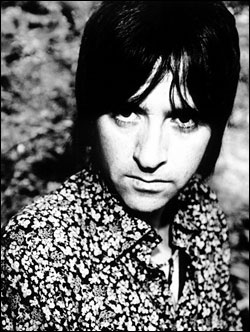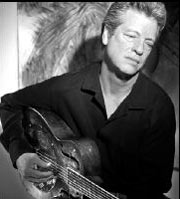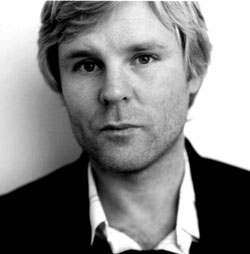I wanted to be known in a certain way,” says Johnny Marr. “For better or worse, it happened for me. I wanted to be known for what I did, not what I said.”
Though the Smiths broke up 15 years ago, Johnny Marr is still best known for that associationas the guitarist whose understated arpeggios cushioned the flamboyant adolescent posturing of the band’s opinionated singer. The ensuing years have seen him jump from project to project, whether in collaboration with New Order’s Bernard Sumner as Electronic or his myriad guest appearances on albums by Bryan Ferry, Oasis, Neil Finn, and The The. Not unlike John Paul Jones, that similarly quiet and underrated member of Led Zeppelin, Marr centers his life not on celebrity but on music. “You have to have a life to keep yourself interesting and interested,” he says.
Marr is currently excited because his latest effort, Johnny Marr and the Healers, is the first post-Smiths project to bear his name. On Boomslang, the group’s debut disc, Marr takes center stage as the group’s frontman and vocalist. While Marr’s voiceoften reminiscent of Oasis’ Liam Gallagheris a new sensation for listeners, the album’s music offers many familiar delights: Much of the album is a lush, dense wall of guitar and electronic effects that recalls the psychedelic strains of ’90s shoe-gazers pumped up with a touch of Manchester adrenaline, while other songs are gently aligned with acoustic guitars and shimmering accents.
“I thought I wanted to make a record that was less layered, and some of the songs were done that way,” says Marr. “But when I came to finish the record, I decided to do what comes naturally and what excites me, and that is to put all these different colors on it and not worry about any kind of agenda. What comes natural to me is if I hear a part, I can’t help but put a capo on a Gretsch and see what happens if I play that along with it. Your mind is going, ‘Stick with the plan.’ But my instinct was saying, ‘Fuck the plan.’ I’m glad I’ve done that.”
With bassist Alonza Bevan and drummer Zak Starkey (Ringo’s son), Marr has the supporting cast he needs to achieve a fairly stirring sonic vision. However, he’s not much impressed with the music in general or the way artists are selling themselves these days.
“We like the idea of being outsiders. Joe Moss [the Smiths’ manager and now Marr’s] is the kind of manager who is there in the studio with you at 4 in the morning,” he says. “The Smiths felt like outsiders, and that feels even more important with everything being so corporate. Not just the music industry, but the world we live in. The powers that be dreadfully underestimate the perception of a fairly discerning part of the record-buying public. I’m not having it that you can just buy credibility. People that just want to switch off and buy [music] like a coffee-table book may buy it, and good for them, but other people can spot a phony in a heartbeat. There’s always people who want to do something real. That’s what keeps me going. I’d hate to judge myself in any other company.”
Marr’s attitude took many music-biz insiders off guard as he negotiated with a number of labels before signing with indie co-op imprint iMusic. “Some of the people I would meet with had this look in their eye like, ‘Shit, this guy’s an anarchist.’ But when you listen to the music I make, I don’t sound like an anarchist. I have a fairly good way with a tune. Our approach with this record was, let’s take a shot at the music and see if the economics work out. I didn’t have to explain to iMusic to not force me to make a video for $100,000 that made me look like an idiot. ‘Please don’t make me walk around Barcelona in a white suit with a model.'”
Mostly, though, Marr admits to being a sentimentalist, an old-school romantic who’s never forgotten the impact music made on his life. “When I bought New Values by Iggy Pop, walking home with that big 12-inch record in the bag, it was another little layer of my identity added, because my record collection had just been increased by one great new album,” he says. “I think I was walking home two inches taller without even hearing it. Those days are gone a bit. The format is so disposable. You can put it in your pocket and lose it. But it’s OK. What we lose in some ways, we benefit in others.”







